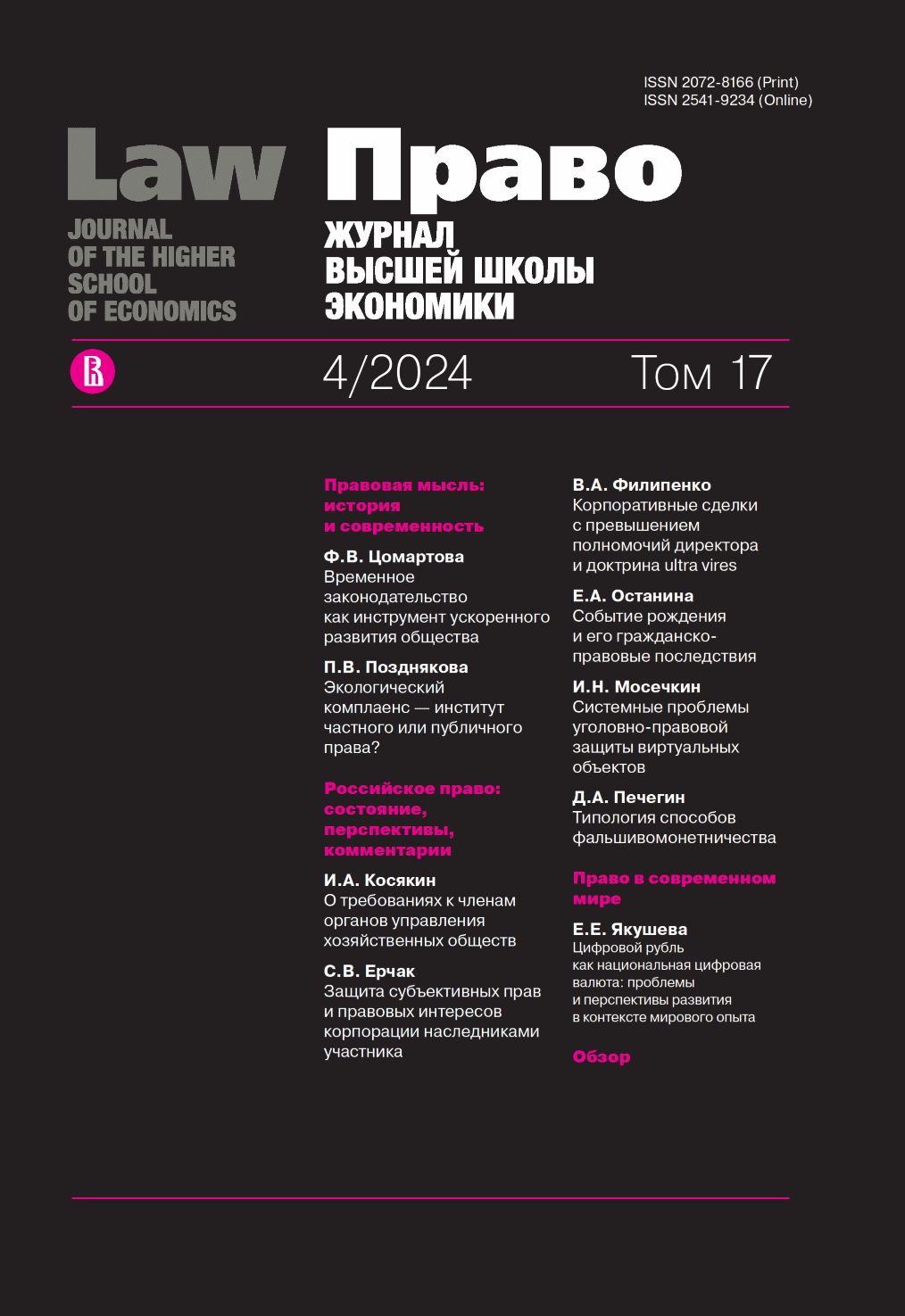The Corporate Transactions with Director's Exceeding Authorities and the Doctrine ultra vires
Abstract
The article suggests an alternative view on understanding and application of the provisions of Russian law regarding nullification of the corporate transactions committed in conflict with representational powers of directors. The purpose of the research is to consider ways to improve legislation and judicial practice on this issue, drawing on foreign doctrine and key judicial cases; to harmonize relevant legal solutions with the Russian legal system. The first part of the article notes that the current wording of Article 174 of the Civil Code of the Russian Federation creates difficulties for challenging of transactions committed in violation of powers or interests of a legal entity, so far as in practice it is often extremely difficult to prove bad faith and negligence of the counterparty, presence of collusion or causing apparent damage to the company. The situation is aggravated by judicial practice and explanations of the Supreme Court of the Russian Federation. In the second part of the article the author shows that common law jurisdictions have developed the doctrine applied with consideration of the objective good faith of the director. Selected Anglo-American cases demonstrate that director's exceeding of the authorities is a special case of breach of fiduciary duty of loyalty. In foreign law, transaction performed by a director in evident breach of this duty may be invalidated. So it is important to understand that foreign doctrine and practice approach the challenge of corporate transactions more functionally and with recognition of the formal structure of fiduciary responsibility. Russian law, on the contrary, distances from clarification of the issue of director's bad faith, attaching more importance to the negligence of the counterparty and rather formal criteria of causing damage to a legal entity. Based on the results of the study, the author concludes that this approach is not sufficiently correspond to the idea of protecting interests of the corporation and its participants and the concept of fiduciary duties, as well as in necessary to borrow some solutions from foreign experience.
References
Budylin S. (2008) Going Beyond: The Ultra Vires Problem in Russian Corporate Law. Columbia Journal of East European Law, vol. 2, no. 1, pp. 128–141.
Cahn A., Donald D.C. (2010) Comparative Company Law: Text and Cases on the Laws Governing Corporations in Germany, the UK and the USA. Cambridge: University Press, 956 p. DOI: https://doi.org/10.1017/CBO9780511779909
Egorov A.V., Papchenkova E.A., Shirvindt A.M. (2016) Representation: a Study of Judicial Practice. Moscow: Statut, 383 p. (in Russ.).
Eisenberg M.A. (2006) The Duty of Good Faith in Corporate Law. Delaware Journal of Corporate Law, vol. 31, no. 5, pp. 1–75. DOI: https://doi.org/10.1515/ECFR.2006.001
Glazunov A.Yu., Gorchakov D.S., Chuprunov I.S. (2020) Commentary to Courts Practice on Applying Legislation on Business Companies. Vestnik ekonomicheskogo pravosudiya Rossiiskoi Federatsii=Bulletin of Economic Justice of the Russian Federation, no. 10, pp. 79–134; no. 11, pp. 101–171 (in Russ.)
Gower (2021) Principles of Modern Company Law. Davies P., Worthington S., Hare C. (eds.) 11th ed. London: Sweet and Maxwell, 2134 p.
Griffin S. (1998) The Rise and Fall of the Ultra Vires Rule in Corporate Law. Mountbatten Journal of Legal Studies, vol. 2, no. 1, pp. 5–31.
Gutnikov O.V. (2019) Corporate Liability in Civil Law. Moscow: KONTRAKT, 488 p. (in Russ.)
Hicks A., Goo S.H. (2008) Cases and Material on Company Law. 6th ed. Oxford: University Press, 688 p.
Karapetov A.G. (2018) Application of Article 174 of the Civil Code. Vestnik grazhdanskogo prava=Civil Law Review, no. 1, pp. 86–147 (in Russ.)
Karapetov A.G. et al. (2018) Transactions, Representation, Limits of Actions: a Commentary to Articles 153–208 of the Civil Code. Moscow: Logos, 1264 p. (in Russ.)
Kuznetsov A.A. (2017) Limits of the Autonomy of Will in Corporate Law: a sketch. Moscow: Statut, 160 p. (in Russ.)
Langbein J.H. (1995) The Contractarian Basis of the Law of Trusts. Yale Law Journal, vol. 105, pp. 627–675. DOI: https://doi.org/10.2307/797196
Lomakin D.V. (2008) Corporate Legal Relations: General Theory and practice of Applying. Moscow: Statut, 511 p. (in Russ.)
Lomakin D.V. (2019) Fiduciary Obligations in Corporate Relationships. Grazhdanskoe pravo=Civil Law, no. 4, pp. 3–8 (in Russ.) DOI: https://doi.org/10.18572/2070-2140-2019-4-3-8
O’Sullivan J. (2000) Rescission as a Self-Help Remedy: A Critical Analysis. The Cambridge Law Journal, vol. 59, no. 3, pp. 509–543. DOI: https://doi.org/10.1017/S0008197300000222
Sealy L.S. (1971) Cases and Materials in Company Law. Cambridge: University Press, 879 p.
Sealy L.S. (1985) Ultra Vires and Agency Untwined. The Cambridge Law Journal, vol. 44, no. 1, pp. 39–41. DOI: https://doi.org/10.1017/S0008197300114412
Shershenevich G.F. (1907) Russian Civil Law: a textbook. Saint Petersburg: Bashmakovykhs Print, 815 p. (in Russ.).
Shitkina I.S. et al. (2019) Corporate Law: a textbook. Moscow: Statut, 735 p. (in Russ.).
Smith T.E. (1885) A Summary of the Law of Companies. London: Stevens and Haynes, 207 p.
Spencer R. (2004) Corporate Law and Structures: Exposing the Roots of the Problem. Oxford: Corporate Watch Press, 32 p.
Vann V. (2006) Causation and Breach of Fiduciary Duty. Singapore Journal of Legal Studies, pp. 86–107.
Vitryanskiy V.V. (2018) Reform of Russian civil legislation: interim results. Moscow: Statut, 528 p. (in Russ.).
Wedderburn K.W. (1962) Ultra Vires and Redundancy. The Cambridge Law Journal, vol. 20, no. 2, pp. 141–146. DOI: https://doi.org/10.1017/S0008197300010400
Wedderburn K.W. (1967) Ultra Vires or Directors’ Bona Fides? The Modern Law Review, vol. 30, no. 5, pp. 566–571. DOI: https://doi.org/10.1111/j.1468-2230.1967.tb01140.x
Copyright (c) 2024 Filipenko V.A.

This work is licensed under a Creative Commons Attribution-ShareAlike 4.0 International License.


















